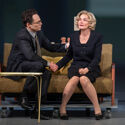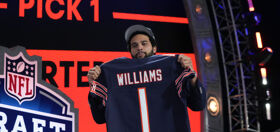
Welcome to Screen Gems, our weekend dive into queer and queer-adjacent titles of the past that deserve a watch or a re-watch.
The Powerhouse: The Hours
Nicole Kidman scored an Oscar for her work as bisexual writer Virginia Woolf in this adaptation of Michael Cunningham’s Pulitzer Prize-winning novel, and with good reason.
The Hours tells the story of two, possibly three queer women living in three different time periods. In the early 20th century, Virginia Woolf (Kidman), suffering from bipolar disorder and writer’s block, struggles to pen her new novel, Mrs. Dalloway. In the 1950s, housewife Laura Brown (Julianne Moore) reads a copy of Mrs. Dalloway, her only reprieve from a loveless marriage and boring life. Worse, she already has one precocious child she doesn’t quite know what to do with, and has learned she’s pregnant again. In 2001, bisexual writer Clarissa Vaughn (Meryl Streep), whose nickname is Mrs. Dalloway, readies a party for her best friend/former boyfriend Richard (Ed Harris). Richard, a popular gay poet, will receive a special lifetime achievement award which he attributes more to his dying of AIDS than his actual work.
It may sound complicated, though in this case, the opposite is true: no plot description could ever really do the interwoven narratives of The Hours justice. In the hands of queer director Stephen Daldry, Cunningham’s rich meta prose comes to life as few films do: this is a movie that comments on itself as much as on its characters. As Virginia scratches down the words to her novel, the chaos of Clarissa’s life seems to reflect it. Larua, the most isolated of the three characters, seems to want to be Mrs. Dalloway. For Laura, a life of tragedy–but an authentic one–sounds far more appealing than her comfortable, mundane existence. One scene between Laura and a neighbor (Toni Collette, in a stunning, but brief turn) also implies she harbors same-sex attraction. Had she been allowed to explore her sexuality, Laura Brown might have lived a much happier life, and avoided an unforgivable sin…
How about we take this to the next level?
Our newsletter is like a refreshing cocktail (or mocktail) of LGBTQ+ entertainment and pop culture, served up with a side of eye-candy.
The Hours preoccupies itself with queer identity as few films do. Besides the stories of the three women at its center, the film makes astute observations about gender relations, sexual fluidity, gay parenting, the AIDS epidemic, and male identity in the face of middle age. It also meditates on the certainty of death. In Virginia’s time period, one character pines for life, even if it means it will kill her. Laura wishes for death as a release from the endless tedium of her life. Clarissa can’t stand the thought of Richard’s inevitable death, and what life will mean without him. The Hours knows that the sting of mortality does not afflict the dead. Loss experienced through death afflicts only the living.
Loaded with rich dialogue, magnificent performances and a delicate score by Philip Glass, The Hours reminds us how movies can touch and reflect our lives. It’s a film that relishes its queerness, and speaks truth about love, death, and life. For the characters that embrace love and truth, life offers joy and hope. For the character that does not, it will bring endless misery.
Streams on HBO Max, Amazon, YouTube, & VUDU.




















jayceecook
Love, love, LOVE this film. One of my favorites. Definitely top 3 for me.